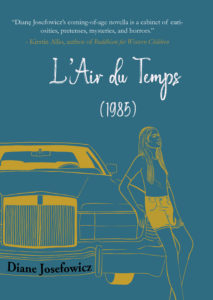Review by Carla Panciera
L’Air du Temps is the name of a perfume and the title of Diane Josefowicz newest book, the first in a proposed trilogy. (Josefowicz’s debut novel is Ready, Set, Oh, also set in her home state of Rhode Island). This is a beautifully written book, a clinic on how to pare down writing to its essentials. Each brief chapter, carefully crafted sentence, pinpoint perfect detail, is evidence of a writer who understands exactly what a scene needs to resonate with a reader.
Translated, the book’s title loosely means the current fashion, but thirteen year old Zinnia Zompa, the story’s protagonist, tells her mother it can also mean song of time. What unfolds is absolutely a song of time. 1985, to be exact, the era of Clairol hair color, MTV, Lava soap, and Shake n Bake. It is also a time in a young person’s life when the truth about the adult world begins to emerge, especially for a child as observant as Zinnia who, “sick with memory,” tells the story from two decades into the future.
Little wonder that Zinnia needs some distance from the actual events to describe them because piecing together the truth in Maple Bay means sifting through the strange ambiguities and coincidences of that place. For example, the book focuses on the years following the murder of Zinnia’s neighbor and her father’s business associate, Mr. Marfeo, whose body is discovered in a yellow Mercury. However, the town is full of yellow Mercurys. Zinnia’s family owns one, as does her science teacher. The person arrested for the murder is one James “JT” Thompson, one of several aliases for a man who “had a wallet full of fake drivers’ licenses.” (4) Witnesses place JT—or his identical twin brother—in one of two silver Lincoln Continentals, one owned by the victim, the other by the accused.
Meanwhile, in their L-shaped ranch, the Zompa family assumes the facade of an All-American family on the rise. Josefowicz is the master of the family tableau. One kid loads the dishwasher, another lays across the carpet doing her Spanish homework; the mother mixes the father a scotch on the rocks, baseball game playing on the television. A cross country road trip includes the father stopping for gas, a box of donuts, and a six pack, then pointing out pumpjack wells on the coast as his daughters spear black ants with cocktail toothpicks. Pre-Facebook evidence of a “normal” family.
But these finely wrought scenes are juxtaposed with signals Zinnia doesn’t yet have the sophistication to grasp. Zinnia can see, for example, that when her mother pines after jewels that are not made in her husband’s factory, her father “cocks an eyebrow. The future flashes across his face like the shadow of an airplane where it should not be, racing along the wall of some high room. There is something he knows that she doesn’t.” (12)
The adult Zinnia, of course, understands the contradictions inherent in what one presents to the world and what happens in the charged settings of real families. She says, of her childhood home, “The grass was thriving. The shrubs were thriving. We seemed to be thriving too. Point of fact: We were not thriving.” (2)
This is complex stuff—to capture the not-quite-knowing-but-absolutely-sensing antennae of a very young girl, but Josefowicz maintains a flawless perspective. She is a writer who understands the power of restraint. Mature readers begin to piece together what’s happening, but Zinnia is left with the kind of worryworm many of us remember from our own early adolescence where we understood something was not quite right, but couldn’t discover what it was and had no power to alter its course. She senses her mother’s frustration with the traditional role assigned to her by a husband who doesn’t think she should pursue a career and mocks her interest in painting as a hobby. Her daughter, though, notices that “her subjects were conventional, flowers and fruit, but she had a distinctive high-contrast style, as if she saw the world as a series of bright objects set squarely against dark backgrounds . . . One look and you knew: this was no hobby.” (20)
Zinnia Zompa is a wry, intuitive, engaging narrator who is tough to fool completely and relatively unperturbed by the strange events of the world around her. She admits, “I’m waiting for something—but then what teenager isn’t waiting for something?” (39)
Long past my own teenage years, I’m waiting, too, to see what Zinnia has to say in the next installments of her story.
L’Air du Temps (1985) by Diane Josefowicz
Regal House Publishing, 2024, $17.95 [paperback]
ISBN # 9781933880853
Carla Panciera’s newest book is Barnflower: A Rhode Island Farm Memoir. Her collection, Bewildered, received AWP’s 2013 Grace Paley Short Fiction Award. She has also published two collections of poetry: One of the Cimalores (Cider Press) and No Day, No Dusk, No Love (Bordighera). The recipient of a Mass Cultural Council Grant in prose, Carla is a retired high school English teacher from Rowley, MA.


